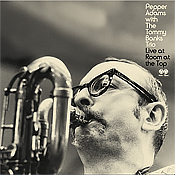Recent Recordings by Area Artists
Pepper Adams was born in Detroit, more specifically in Highland Park, but spent much of his younger years elsewhere as his family life suffered during the depression years. When he was 16, his mother took him back to the Motor City and after meeting Tommy Flanagan he was able to fall into the local jazz scene, eventually playing in the Blue Bird Inn band and elsewhere. In 1956, like many before him, he moved to New York and stayed there for the rest of his life. And while he played with many different groups, ranging from Lionel Hampton to Charles Mingus and Thelonious Monk, he maintained his Detroit connections for his whole lifetime; indeed, the only two combos that he directed for longer time stretches were co-led with Donald Byrd and Thad Jones. In the sixties and seventies, Adams mainly worked with the Thad Jones-Mel Lewis Orchestra that played regularly on Monday nights at the Village Vanguard and with a related quintet with Jones. The first time I was able to hear Adams in person was during the time he was part of that amazing orchestra.

The year 1972 was a busy one for Adams, including a long European tour with the Vanguard orchestra that included Russia and Georgia. In September Adams was invited to the play for four nights at the Room at the Top bar in the University of Alberta student union in Edmonton, Canada, accompanied by a local rhythm section. Some of the music from those nights have now been released as Pepper Adams with The Tommy Banks Trio: Live at Room at the Top (REEL to Real), Pepper Adams, baritone saxophone, Tommy Banks, piano, Bobby Cairns, electric bass. and Tom Doran on drums. The group played from 8:30 P.M. to 1:00 A.M. each night; the current recording appears to consist of one set with two tracks added from another one.
The performances were apparently broadcast on Alberta’s CKUA public radio station. Banks, although not a familiar name this side of the border, was a well-known in Alberta, as a pianist, arranger, and band leader, who eventually became a senator. At the time he hosted a weekly talk show on CBC. His trio mates, both recently deceased, worked alongside him for decades in Edmonton in his trio, big band, and on his shows: Cairns was best known as a guitarist, but picked up the electric bass for this gig, and Doran was an equally accomplished all-round drummer, equally at home playing jazz, rock, or stage shows.
The hitherto unreleased performance presented here comes from the second night when Adams and his new collaborators had clearly become familiar with each other, with the Canadians providing highly idiomatic contributions to the music. Banks was a lively, expressive pianist, whose bebop chops were well suited to the demands of the visiting saxophonist. His chordal voicings are well matched and like his bandmates, his rhythmic drive was well suited to Adams’ forward pushing manner of playing. I count among those who are less than fond of the electric bass in bop, but Cairns was one of the few who could make it swing. The four musicians dug in strongly into the music, with the seven selections included on this album clocking in at almost two hours, most of them quite long, with extensive solos. The repertoire was a typical Adams collection, consisting of standards such as “Oleo,” “Time on my Hands,” and “Stella by Starlight,” two Thad Jones classics, as well as two of his own compositions. The complete set was bookended by Jones works, opening with “Three and One,” which was a feature for both Jones and Adams in the Vanguard band, and the closing “‘Tis,” which the baritonist used for years as a set ender.
The first tune established the pattern for what was to follow, a bop set with Adams in full form, working through the familiar changes with excitement and witty quotes. He was not just a saxophonist, but a baritone saxophonist, and although he had played tenor earlier and had enjoyed snitching horns with the tenorist Wardell Gray during the time they played together, he stuck doggedly with the larger horn, refusing to double on other saxophones and bass clarinet, which would have given him access to studio playing and more secure income. Adams had a unique sound on his instrument, hard and expressive, very different from the softer timbres of his much more popular contemporary Gerry Mulligan. This sound, combined with complex rhythmic and harmonic sensibilities that he shared with some of his Motor City friends such as Thad and Elvin Jones, were the foundations of his unique style that is on full display here, well recorded and the occasional reed squeaks that come through only add to the sense of being at a gig that makes this album so compelling. And a lively evening this was. There is only one slow ballad, the leader’s own “Civilization and its Discontents,” a title reflective of his wide-ranging reading habits, and this one picks up into double time halfway though the saxophone and piano solos, becoming a hard driving swinger, only slowing down again for a bass outing and the final theme. Here, as throughout, the Canadian trio provides robust idiomatic collaboration, working impeccably together and soloing with expressive, often witty, full command of the requisite musical language.
This delicious piece of Detroit-associated jazz history is required listening for anyone who likes Adams and the baritone saxophone.